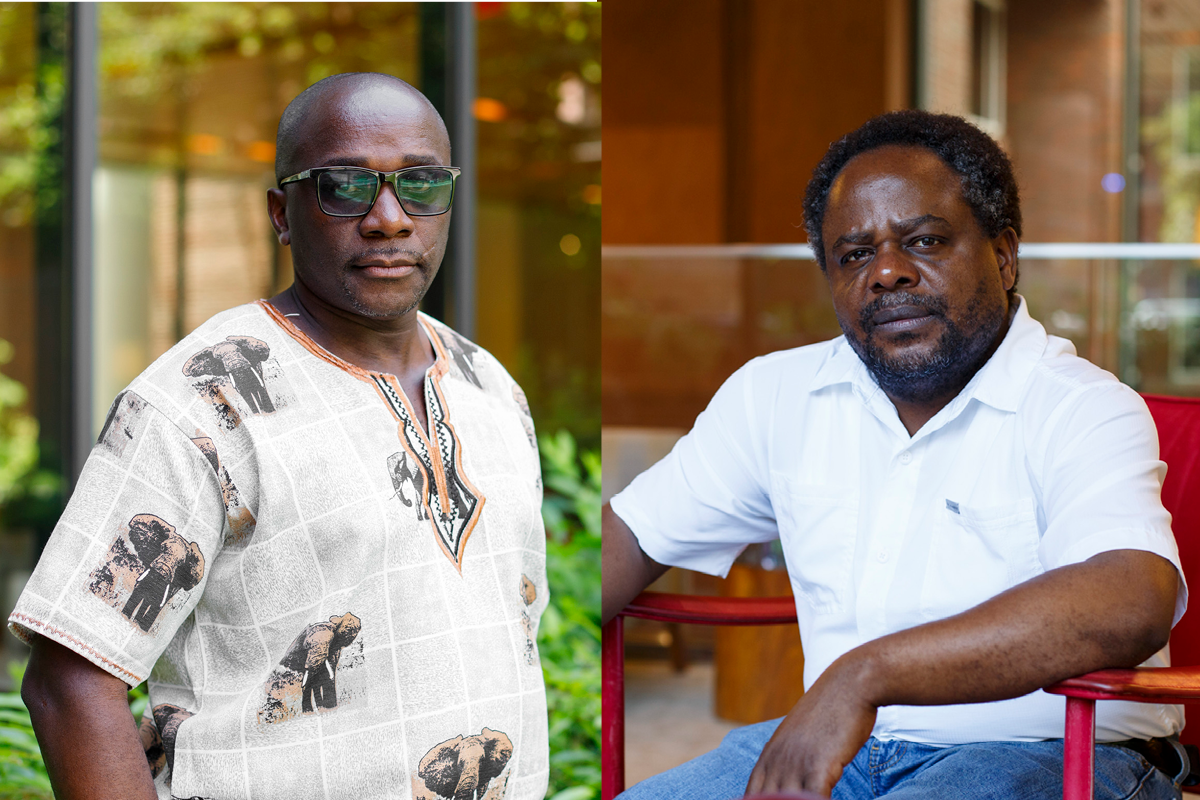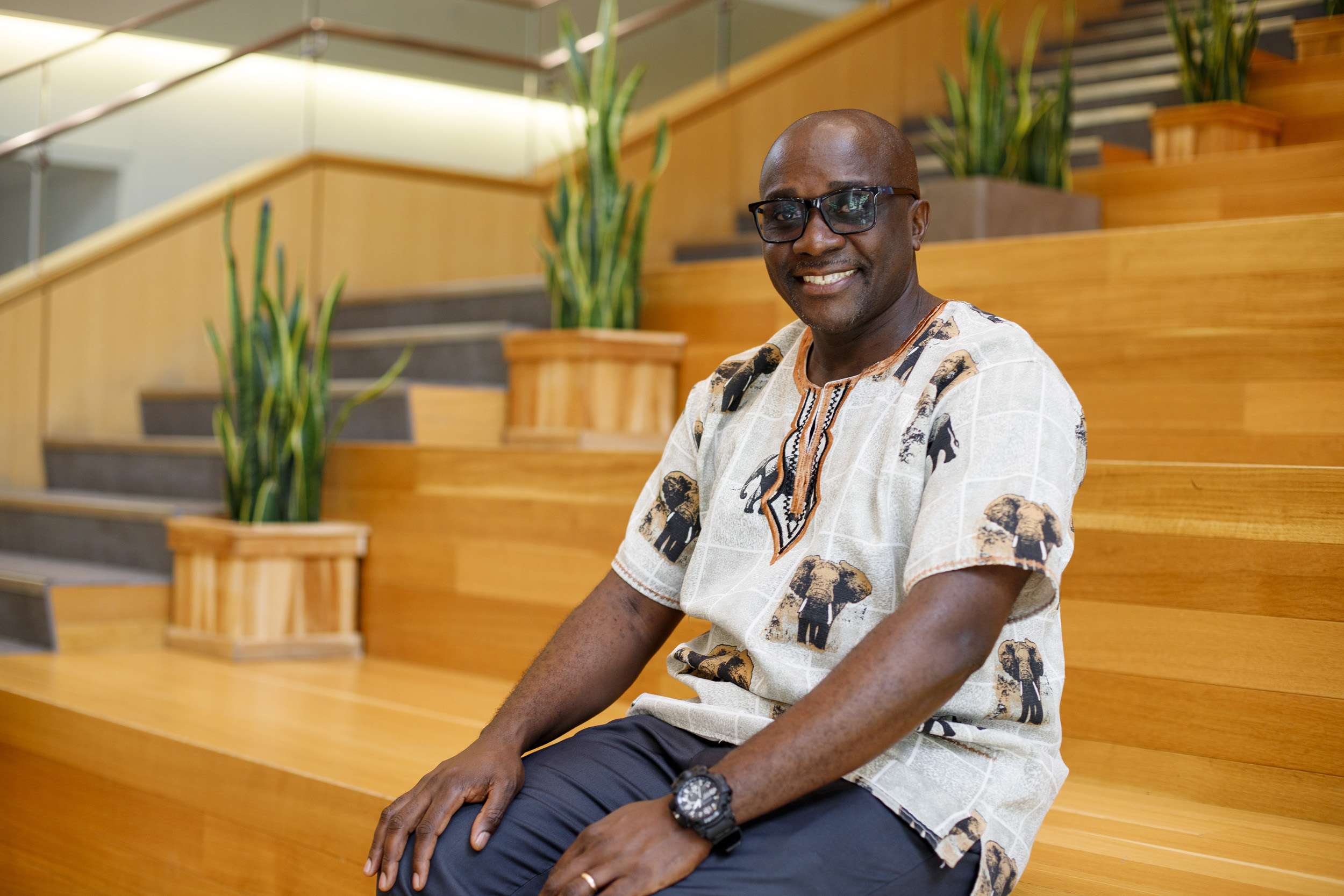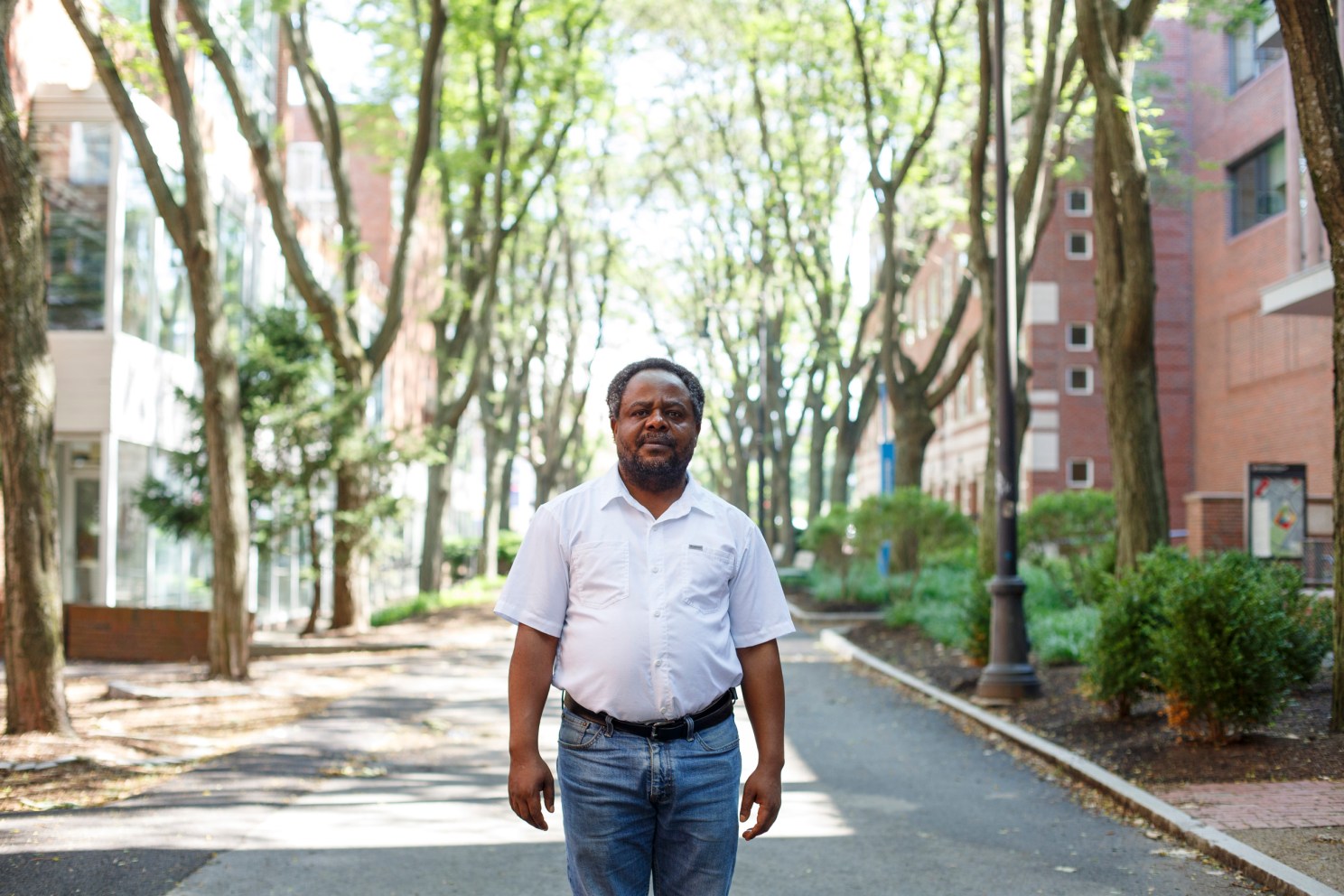
Sylvester Danson Kahyana (left) and Amani Matabaro Tom.
Photos by Grace DuVal
How a few Facebook posts brought heat on Ugandan professor
Sylvester Danson Kahyana, Congo activist Amani Matabaro Tom finish terms as Scholars at Risk
Sylvester Danson Kahyana has written poetry and children’s literature, but what seems to have gotten him in trouble was what he wrote on Facebook. Amani Matabaro Tom is a longtime activist who spoke out on child labor abuses and environmental effects of mining in the Democratic Republic of Congo.
Both are finishing out 10-month stints as Fellows at the Carr Center for Human Rights Policy as part of the Scholars at Risk program after facing persecution and threats of physical violence in their home countries for speaking out against their governments and what they viewed as corrupt practices.
“Each one of them became viral … forwarded so many times. I started public debates about governance, about the pandemic and governance about the Ministry of Education, which is what a university professor should do.”
Sylvester Danson Kahyana
Kahyana was something of an accidental activist. He was an associate professor in the Department of Literature at Makerere University in Uganda, with a Ph.D. in English studies from Stellenbosch University, South Africa. During the pandemic, he began posting critiques about the government’s handling of elements of the crisis.
“I didn’t even write very many, maybe 10 Facebook posts in nine months,” Kahyana said. “Each one of them became viral … forwarded so many times. I started public debates about governance, about the pandemic and governance about the Ministry of Education, which is what a university professor should do.”
The posts were written while Kahyana, a father of six, was living in the U.S. and working as a Fulbright Scholar at Michigan State University. Among the issues he raised was the poor handling of remote learning by Janet Museveni, Uganda’s minister of education and wife of President Yoweri Museveni, who has been in power since 1986.
“She’s not a teacher,” Kahyana said. “And we’re going to expect her to have any clue on how to manage the studying during the pandemic?
“I returned to Uganda November 2021,” he said. “When I went back, there were a lot of threats on my Facebook: ‘You think you will be in the U.S. forever. You’re coming back, where I’ll be waiting for you,’ and so on. My posts were meant to start debate in a very responsible way. I did not take those threats seriously.”
Other Ugandan writers, however, faced government retribution for their criticisms. Kakwenza Rukirabashaija, a novelist and lawyer, was arrested and tortured in 2021 for his novel “The Greedy Barbarian” — a thinly veiled critique of Museveni — before escaping to Germany.
In 2022, Stella Nyanzi, a Ugandan human rights advocate, was also exiled to Germany after serving two jail sentences for her outspoken critiques of Museveni.

Kahyana, a former president of the Uganda branch of the global writers organization PEN, wrote several poems critical of the government in response to what happened to Rukirabashaija, who is also a PEN member.
One night in late April 2022, Kahyana was attacked and robbed by two men armed with a machete. “I thought they were thieves so I gave them my bag,” Kahyana said. “I gave them my phone. I gave them everything. After giving them everything, they cut me.”
Kahyana grew suspicious. He says when he discovered his cellphone service had not been shut off and his Gmail hacked, he began to suspect they had a more nefarious motive.
“Now robbers never do that,” he said. “Robbers just remove the SIM card because they want to sell the gadget.”
Fearing for his life, Kahyana fled to Finland, South Africa. Then Malawi.
“Basically, I was restless, because I knew anytime they could finish me off. Then I applied to the Artist Protection Fund, which is an organization run by the Institute of International Education. I won it, but in that process, I also received an email from Harvard,” he said.
Kahyana arrived on campus in November and has been working on papers about Uganda’s anti-homosexuality laws and transnational repression.
“The anti-homosexuality law is not just about homosexuality; it is actually about using law to control dissidents. It doesn’t matter that I’m not [gay], but the government will have used that declaration to its own purpose, to have me in prison for three weeks, as investigations take place, and so on. And then you have to report every week to the courts of law,” he said.
He added the government still has a grip on what he can and cannot do politically because he still has family in Uganda. He’s currently trying to get his eldest daughter to the U.S. to join him, his wife, and four of their other children.
Kahyana said he has been talking to other local universities about joining their faculties after his time at Harvard ends in September.

Unlike Kahyana, Tom, a married father of six from the Democratic Republic of Congo, has made a career out of activism.
He is the founding director of Action Kivu and co-founder and executive director of ABFEC, a partnering nonprofit. The two work to raise funds and awareness and support community-based initiatives to help those affected by the ongoing armed conflict in the North and South Kivu provinces of eastern Congo.
He also founded the Congo Peace School Program, which aims to provide students affected by the war with quality education in an effort to keep them from being lured into local militias and mines.
His work with the Enough Project, a shuttered nonprofit that had its roots as a project of the Center for American Progress, focused on uncovering corruption in the export of strategic minerals from Congo.
“It is a region where there is an ongoing humanitarian crisis,” Tom said. “Our research was focusing on the lack of transparency on the strategic minerals supply chain, and our focus was on the three T’s.” Gold and the “three T’s” — tin, tungsten, and tantalum — are used in everything from electronics and cars to medical devices and even household goods. Congo is rich in these minerals, and export has been largely controlled by militias and often corrupt politicians.
“My work over the past years has been to try to show the link between the ongoing armed conflict with illicit exploitation of these minerals,” Tom said. “I see, unfortunately, history repeating itself over and over again.”
“My work over the past years has been to try to show the link between the ongoing armed conflict with illicit exploitation of these minerals. I see, unfortunately, history repeating itself over and over again.”
Amani Matabaro Tom
From the late 1800s into the early 20th century, Congolese rubber exports, which surged to feed a booming automobile industry, were controlled by Belgium, which had colonized the area.
“It’s no longer the automobile industrial revolution. It is now tech industrial revolution,” Tom said.
Tom and his colleagues at the Enough Project have spoken out against child labor abuses, as well as the environmentally damaging impacts of mining. Because of this, Tom says he became a target of threats and violence from unknown sources.
“I became an easy target because I was leading this nonviolent movement,” he said. “There was a time where my house was completely set on fire after an interview denouncing over-militarization of mining areas. I’ve been threatened by text messages, by calling me on the phone with unknown numbers, asking me to step down, asking me if I don’t stop doing the work I’m doing they will kill me, they know where I live. That it doesn’t take them 10 minutes to shoot a bullet in my head. Very, very traumatizing, very challenging, very difficult.”
Like Kahyana, Tom has family he’s left behind. All his children are too old to be eligible for entrance to the United States under his visa except for one son who is 18. His daughters currently live in a conflict zone on Congo while his older son lives in Kenya.
“It is an everyday threat. Even before joining this program we were hiding,” Tom said.
At one point, he said, unknown attackers killed the family dog.
“I am 47 years old. But for the past three decades, I’ve seen nothing done well in my country,” he said. “Right after the Rwandan genocide in 1994 I’ve seen nothing other than war and violence.”




